PRINCETON, NJ -- Most Americans think the United States has an obligation to remain in Iraq until a reasonable level of stability and security has been reached.
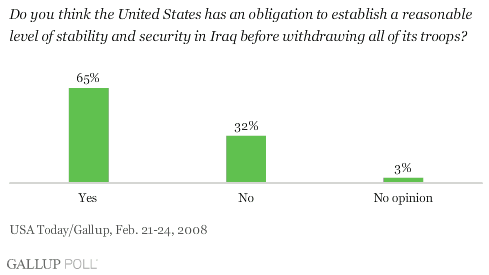
Although about 60% of Americans perceive that the United States' initial involvement in the Iraq war was a mistake, fewer than 20% say the United States should initiate an immediate withdrawal of troops. (See "Americans on Iraq: Should the U.S. Stay or Go?" in Related Items.)
Why is this the case? A review of the responses to several questions on Iraq in a recent USA Today/Gallup poll provides some indication of the reasons an apparently conflicted American population is hesitant to recommend immediate withdrawal despite its basic feeling that U.S. involvement there has been a mistake.
As the accompanying graph indicates, almost two-thirds of Americans believe the United States has an obligation to establish a reasonable level of stability in Iraq before withdrawing all troops.
The poll did not ask Americans directly if they felt that such a "reasonable level of stability" had yet been reached. But a recent CBS News/New York Times poll found that a majority of Americans believe things are going badly for the "U.S. in its efforts to bring stability and order to Iraq." This suggests that Americans don't feel stability is yet the norm in Iraq, and thus -- based on the attitudes measured in the Gallup Poll question -- that it is necessary for troops to remain in Iraq until such a stable state is reached.
Additionally, more than 60% of Americans feel al Qaeda would be more likely to use Iraq as a base for its terrorist operations if the United States withdraws its troops than if it keeps its troops there, mirroring one of the Bush administration's (and presidential candidate John McCain's) most frequently used arguments against an immediate withdrawal of troops from Iraq.
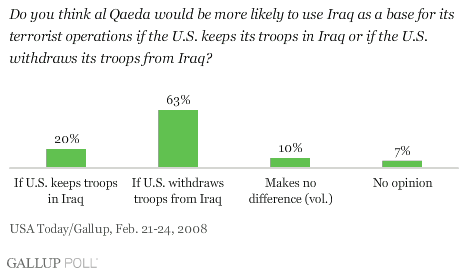
A majority of Americans also believe more Iraqis would die from violence in that country if the United States withdraws its troops than would be the case if the United States keeps its troops there.
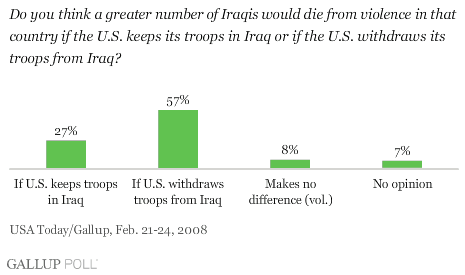
Half of Americans say the likelihood of a broader Middle East war would increase if the United States withdraws its troops from Iraq, while just 35% say that prospect is more likely if the United States keeps its troops in Iraq.
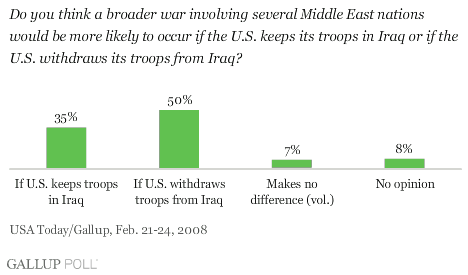
Americans are not convinced, however, that the possibility of terrorist attacks against the United States would increase if the country withdraws its troops from Iraq -- about as many say such attacks are more likely if the United States keeps troops in Iraq as say they are more likely if the United States withdraws its troops.
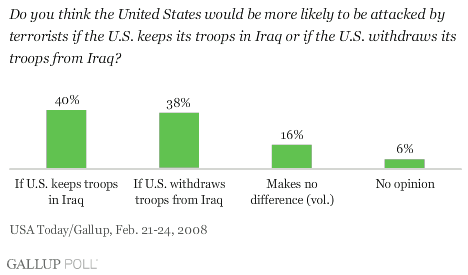
Implications
Americans have -- perhaps inevitably, given the complex nature of the war in Iraq -- a set of somewhat ambivalent attitudes about the situation there. In Gallup's latest poll, 59% of Americans say U.S. involvement in the war in Iraq was a mistake. One might think, therefore, that a similar majority would favor an immediate withdrawal of troops from that country. But that's not the case. Less than 20%, in fact, say the United States should withdraw troops immediately. The rest say either that troops should stay in Iraq as long as necessary, with no timetable for withdrawal, or that there should be a gradual timetable for withdrawal.
The data reviewed here suggest that there are reasons Americans hesitate to recommend an immediate withdrawal of troops. A majority of Americans believe that withdrawing troops from Iraq would lead to a greater possibility of al Qaeda using Iraq as a base for terrorist operations, a greater number of Iraqi deaths from violence, and a greater likelihood of a broader Middle East war. Additionally, Americans believe the United States has an obligation to remain in Iraq until that country is stable, and recent poll results suggest that a majority of Americans do not believe a level of stability has yet been reached.
(Americans are not inclined to believe there would be an increased chance of terrorist attacks against the United States if its troops were withdrawn.)
The next U.S. president will face this confused landscape. Americans obviously are negative about the entire Iraqi enterprise (a recent Gallup Poll question shows a majority saying history will judge the U.S. involvement in Iraq to have been a failure), but -- perhaps realistically -- they believe the attempt to extricate the U.S. military from that country is not going to be a simple or straightforward matter.
Survey Methods
Results are based on telephone interviews with 2,021 national adults, aged 18 and older, conducted Feb. 21-24, 2008. For results based on the total sample of national adults, one can say with 95% confidence that the maximum margin of sampling error is ±2 percentage points.
Interviews are conducted with respondents on land-line telephones (for respondents with a land-line telephone) and cellular phones (for respondents who are cell-phone only).
In addition to sampling error, question wording and practical difficulties in conducting surveys can introduce error or bias into the findings of public opinion polls.
